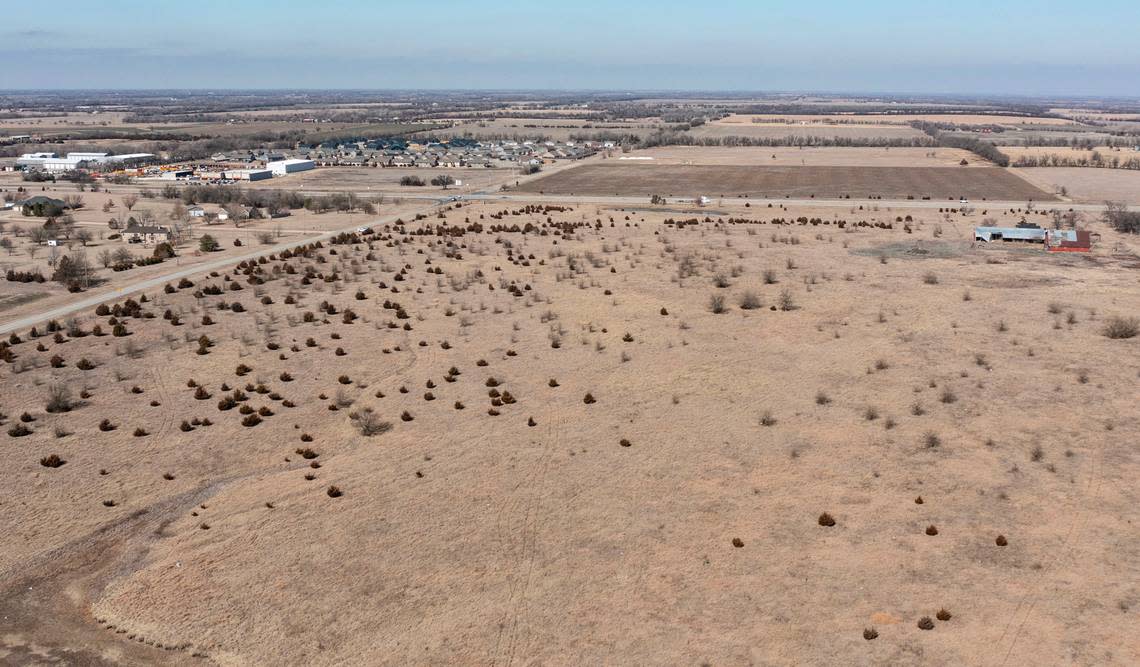Local incentives approved for massive microchip factory near Wichita

Integra Technologies locked in its local incentives package Wednesday as the company seeks federal funding for a $2 billion investment in a semiconductor factory. And the company’s CEO announced a bus program for workers who don’t have reliable transportation.
Integra CEO Brett Robinson has said the company plans to spend more than $2 billion in capital expenditures — mostly equipment and building materials — and hire as many as 2,500 employees at an average annual salary of $51,000.
It plans to build a 1-million-square-foot facility at the southeast corner of the intersection of Rock Road and K-254 in Bel Aire, which approved a 35-year incentive agreement with the company on Tuesday night.
Under the agreements, Integra won’t pay any property taxes for at least 10 years and could receive major property tax incentives until 2059.
The Sedgwick County Commission pledged $500,000 to help pay for the company’s workforce development and training, adding to the $250,000 the Bel Aire City Council approved for training costs. These will be paid out in annual installments of $100,000 from the county and $50,000 from Bel Aire.
The local incentives allow Integra to apply for CHIPS and Science Act funding, a massive multibillion dollar federal program aimed at boosting domestic microchip manufacturing.
The state of Kansas already approved a $304 million APEX incentive program earlier this year. APEX subsidies include refundable tax credits, training costs and payroll tax breaks to a company and five of its suppliers.
None of the state or local incentives will go to Integra if it doesn’t secure CHIPS funding.
Robinson said Integra, which has operated under various names in Wichita for 40 years, plans to stay in Kansas for the long haul.
“When we were in our design meetings for the building the criteria used was to require materials and design elements to make the facility as usable 50 years from now as it is today,” Robinson told Bel Aire City Council members Tuesday. “So the short answer on how long we plan to stay is a long time.”
One of the aspects of the project that is attractive to local leaders is the focus on hiring people without college degrees.
“The majority of our workforce that we plan on hiring, we’re going to be looking for high school graduates and GED equivalents,” Robinson told the County Commission. “And we provide all of the training there at Integra at the training facility in a partnership with WSU Tech.”
Robinson has declined to say what the starting wage will be for entry-level workers.
Commissioner Jim Howell asked Robinson to explain his transportation plan for the microchip plant.
“Earlier, I remember him talking a little bit about some transportation resources would be also provided for folks who need these jobs and don’t have a way to get to the training or get to the place of work,” Howell said. “Can he talk about that a little bit to kind of highlight that?”
“Sure,” Robinson said. “We haven’t announced it officially yet, so maybe this is the announcement, but we do plan on having five buses and we will be reaching out to areas of the community that maybe do not have the opportunity to have reliable transportation or any transportation at all, and we will pick them up and bring them to our new factory.”
“I have four communities that I think would really appreciate that help,” Howell said. “So I just think this is a major part of the total piece of information today.”
County and Bel Aire officials have also committed to work with state partners to seek funding for highway and road improvements around the new plant along K-254 from Rock to Webb. The plan considers walking paths along Rock and Webb and a new frontage access road along K-254.
As for tax incentives, Sedgwick County and Bel Aire plan to approve a tax incremental redevelopment district.
TIF districts allow local governments to freeze the property taxes paid to state, local governments and school districts on undeveloped or blighted areas for 20 years. When the areas are redeveloped, any additional property taxes collected above the original amount are spent in the TIF district or to pay off bonds on investments in the district. The boundaries have not yet been determined.
The TIF district won’t apply for at least the first 10 years because Bel Aire plans to exempt Integra from paying any property taxes during the first decade of the agreement. The Bel Aire City Council approved a letter of intent to issue industrial revenue bonds. The IRBs eliminate sales tax on construction materials for the factory and provide a 10-year, 100% tax abatement on the 100-acre building site.
The Bel Aire incentive agreement also includes a long-term property tax break for the company after the 20-year mark, as long as the company meets its stated investment goals, called an “economic development grant.” The grant will come in the form of an annual payment of 50% of Bel Aire’s share of ad valorem taxes paid annually by Integra. That will stay in place for years 21-30 of the agreement.
In years 31 through 35, Bel Aire has agreed to pay back the company 25% to 35% of its annual ad valorem city taxes, depending on the value of the property. If the value exceeds $50 million, Integra gets a 25% refund. If it exceeds $75 million, the refund increases to 35%. Bel Aire also agreed to advocate for similar economic development grants from school districts and Sedgwick County.
